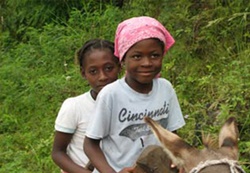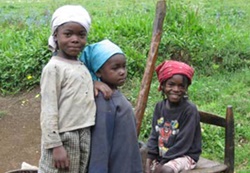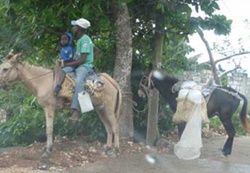



4Ekselans anticipates an exciting future, as we can invest in tomorrow's leaders, training bright, young minds to think in fresh, new ways – productive thinking that will impact their lives in unprecedented ways and inspire them to reach for their full potential. The success of 4Ekselans in advancing its mission to the children, youth, and young adults of Haiti and in accomplishing its goals and objectives to bring positive change, hope, and the development of spirit, mind, heart, and body will rest on our ability to pursue five strategic imperatives in the next few years effectively.
Our Leadership Council meets regularly to pray, strategize, and plan. Both the needs and opportunities are many, but we must determine where to make the most significant impact and achieve the greatest good.
When George Coles, Shelley Rojano, and I, Beverly Najt, first met in 2005 to discuss the founding of 4Ekselans, we agreed to reach out to the less fortunate and most vulnerable children of Haiti, especially those growing up without a father or positive male role model in the home. Among such children, we propose to invest in those who demonstrate promise but require an opportunity to excel.
These children are the reason we founded 4Ekselans. We do what we do because we care! We commit ourselves to salvage lives rich with dormant potential before they are beaten down and wasted. The 4Ekselans team both in the U.S. and Haiti are working together to give Haiti's children a fighting chance against threats to their development into competent adults and leaders. We wholeheartedly desire to make a difference by adding value to their young lives, setting new standards, and creating new performance dimensions. We aim to give them wings!
Entrenched in poverty, many children in Haiti are rich in personal resources (intelligence, gifts, and talents). They simply have had little opportunity to develop them. These children are the next generation of leaders. They are the future of Haiti! We must determine to give them our best.
Consider the problems and needs of Haiti. They are numerous and complicated. Corrupt government reminds us that government by the people and for the people is critical to nation-building. Collapsed infrastructures demand reconstruction. Good schools, housing, roads, potable water, sanitation, and medical facilities are crucial needs. Haiti did not get this needy overnight, nor will her problems be solved overnight. Long before the devastating earthquakes in 2010 and 2021, the recent cholera epidemic, or several destructive hurricanes, the Haitian people had struggled to survive - even when all odds were against them.
People often ask, "Why is Haiti like she is?" Wow! What a question! There are no easy answers, but we know changing the lives of individuals – one at a time - is the most effective way to change the country. Without educated people of character with a new breed of leadership built into them, Haiti's future would not be much brighter than it is today. Therefore, we believe the most urgent and critical need is people who can lead the development and renaissance. I'm speaking specifically of people who are genuinely and comprehensively educated - spirit, mind, heart, and body. These will be people who have learned to lead themselves before attempting to lead others - people who model godly, timeless principles that apply to business, government, and institutions and who possess the leadership skills and character qualities to withstand the heated challenges of change.
The problems of Haiti could consume our thinking, but we have deliberately chosen to focus on the children, youth, and young adults of Haiti consistently and strategically, engaging them one by one. We understand that these children represent a microcosm of community needs: poverty and all the ills that accompany it, oppression, child servitude, debilitating superstition and fear, hopelessness, abuse - physical, mental, and sexual, etc.
Our approach reaches out to the individual because improving individual lives will ultimately impact the nation and produce the next generation of leaders. Indeed, investing in them is one of the most effective ways to move the country forward.
Our part in healing a nation may be small, but many hands working together can achieve rewarding results and change lives. The words of President Woodrow Wilson challenge us, "You are not here merely to make a living. You are here to enable the world to live more amply, with greater vision, with a finer spirit of hope and achievement. You are here to enrich the world, and you impoverish yourself if you forget the errand."
We work with the children because we care for, love them, and are moved by their plights. Investing in them early - in their formative years is essential. We help them build brick by brick on a solid foundation, knowing that character is the foundation that will most certainly enable them to weather the many storms they will encounter, one day realize their potential, and make significant contributions to their world.
We understand they need the survival essentials of food, water, clothing, and housing, but they need so much more to truly thrive. They need a sense of empowerment to rise above the misery they see around them every day. They need to believe that they matter - that they are unique, valuable, loved, and appreciated. They need to understand that they have the power to choose in ways that can produce reliable results for them. James Rhinehart admonishes, "I've learned that our background and circumstances may have influenced who we are, but we are responsible for who we become."